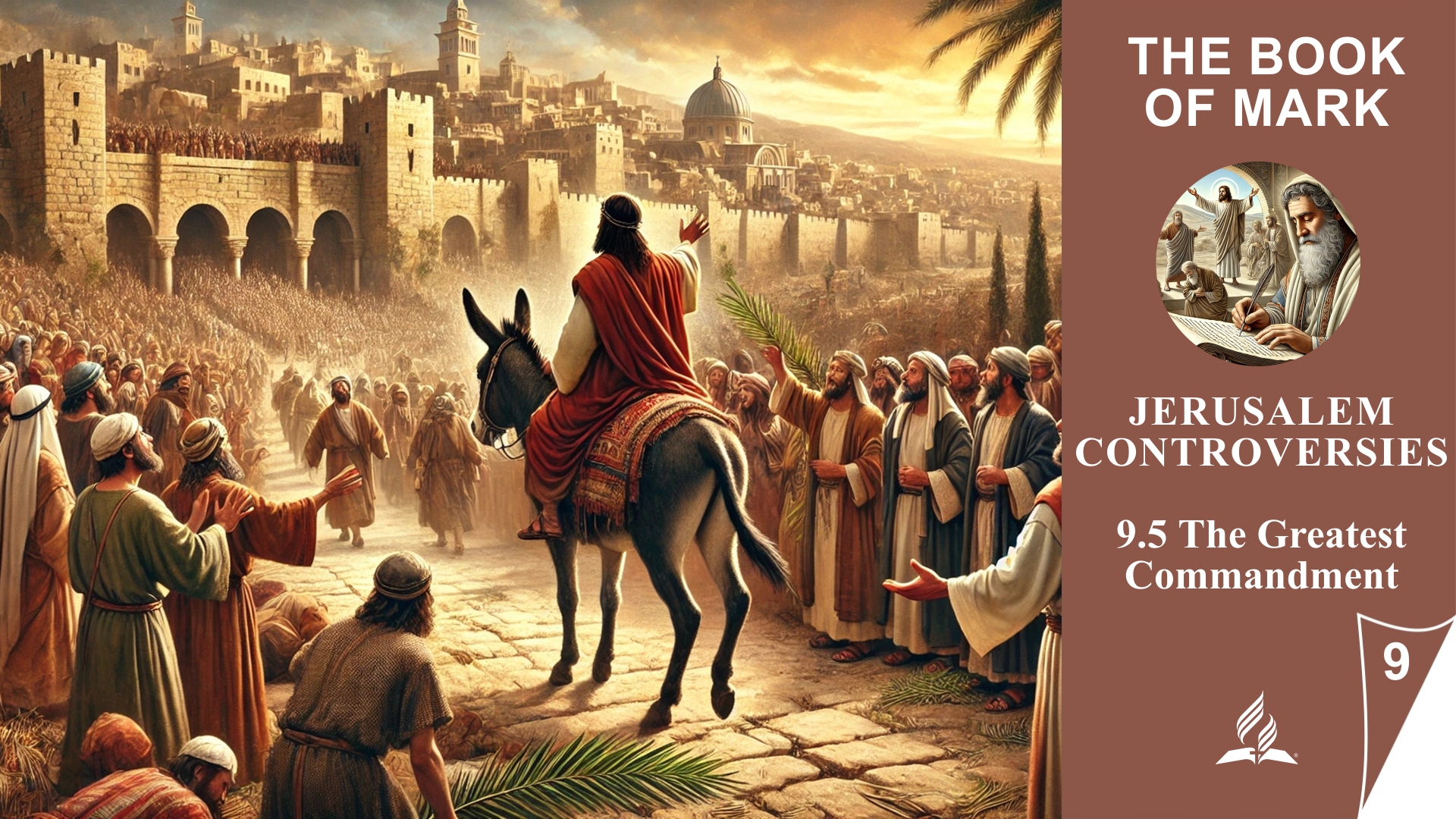


9.5 The Greatest Commandment
The Greatest Commandment: Love for God and Neighbor as the Core of Faith
Read Mark 12:28–34. What profound question did the scribe, who was favorably disposed toward Jesus, ask, and what was Jesus’ twofold answer?
In Mark 12:28–34, a scribe, who distinguishes himself from the hostile attitudes of his peers, asks Jesus a profound question: “Which commandment is the most important?” This question gets to the heart of faith and religion.
Jesus responds clearly and succinctly by quoting the central commandment of the Jewish faith from Deuteronomy 6:4–5: “Hear, O Israel: The Lord our God, the Lord is one. Love the Lord your God with all your heart and with all your soul and with all your mind and with all your strength.” But Jesus doesn’t stop there; He adds that the second most important commandment is to “love your neighbor as yourself” (Leviticus 19:18). This twofold answer summarizes the essence of faith: love for God and love for neighbor, which are inseparable.
The scribe recognizes the truth and depth in Jesus’ answer and publicly affirms it. His recognition shows that he is sincerely seeking the core of faith, unlike most of his colleagues who wanted to trap Jesus. Jesus praises his insight and notes that the scribe is “not far from the kingdom of God”—a hint that he is on the right path but still needs to take the final step: recognizing and following Jesus.
This conversation teaches us that true religiosity is not found in ritualistic actions but in a deep, wholehearted love for God and for our fellow human beings. It challenges us to live our faith through genuine love, which is manifested in fidelity and action. The scribe understood the core of faith, but its ultimate fulfillment is found in following Jesus—a step that challenges us to not only understand but also to live our faith.
How can we learn to love God and our neighbor as ourselves? Why is the cross the key to fulfilling these commandments?
To learn to love God and our neighbor as ourselves, we must undergo a profound transformation of our hearts and minds, made possible by God’s grace and the example of Jesus Christ.
-
Learning to Love God: Love for God begins with recognizing His love for us. The Bible tells us that God loved us first (1 John 4:19). This realization moves us to respond to His love. We learn to love God by spending time in His presence—through prayer, reading Scripture, and reflecting on His works. As we remember who God is and what He has done for us, our love for Him grows. This love is expressed through obedience, trust, and worship.
-
Learning to Love Our Neighbor: Loving our neighbor requires us to shift our focus from ourselves to recognizing the needs and dignity of others. Jesus demonstrated through His life and death what it means to love our neighbor—with compassion, forgiveness, and selfless devotion. We learn to love our neighbor by following Jesus’ example: serving, forgiving, and striving to make peace. It also means treating others as we would like to be treated (Matthew 7:12).
The Cross as the Key to Fulfilling These Commandments: The cross is central to the Christian faith and is key to fulfilling the commandments of love. At the cross, Jesus performed the greatest act of love—He gave His life to redeem us. Through His sacrifice, He not only forgave our sins but also made a way for us to love God and our neighbor.
-
Recognizing God’s Love: At the cross, we see the depth of God’s love for us. This realization leads us to love Him with all that we are.
-
Receiving Grace: The cross shows us that we cannot love perfectly on our own. But through the grace given to us by the cross, we can receive the strength and ability to live out this love.
-
Forgiveness and Reconciliation: The cross enables us to love our neighbors even if they have hurt us because we have experienced forgiveness through Christ. It teaches us to live in God’s love and extend that love to others, regardless of circumstances.
The cross reminds us that true love requires sacrifice but also has the power to change and renew lives—our own and those of others we encounter. Through the cross, we are empowered to fulfill the two greatest commandments and lead a life that honors God and blesses others.
The teaching of loving God and neighbor as the greatest commandment has a profound connection to our daily life and faith.
-
The Priority of Love in Daily Life: The call to love God with all our heart, soul, mind, and strength presents us with the daily challenge of rearranging our priorities. This means that our decisions, actions, and thoughts should be shaped by this love. In daily life, this may involve finding time for prayer and worship but also seeking and acting according to God’s will in every situation.
-
Practical Neighbor Love: Love for our neighbor is demonstrated in our daily interactions with those around us—whether family, at work, or in the community. It means actively attending to others’ needs, showing compassion, practicing forgiveness, and being willing to make sacrifices. This love is not just a feeling but a conscious choice we must make every day.
-
The Cross as Source and Example: The cross is not only a symbol of faith but the source from which we draw the strength to live out this love. It reminds us that Jesus paid the ultimate price for our redemption and encourages us to live in and share this love. In daily life, this means trusting in God’s strength and grace to act rightly—whether in forgiveness, service, or putting others’ needs before our own interests.
-
Transformation and Renewal: Through the cross, we are empowered to align our lives with the commandments of love. It allows us to shed old patterns and live anew in God’s love. This renewal is evident in our relationships, patience, handling of challenges, and in how we reflect God’s love.
Conclusion: The connection of these teachings with our daily lives shows that the Christian faith is not merely a theory but a living practice. Through love for God and neighbor—enabled and empowered by the cross—we can lead a life that honors God and blesses those around us. This love is the core of our faith and should be the guiding thread in everything we do.

The true fulfillment of our faith lies in loving God and our neighbor.
Visited 60 times, 1 visit(s) today







